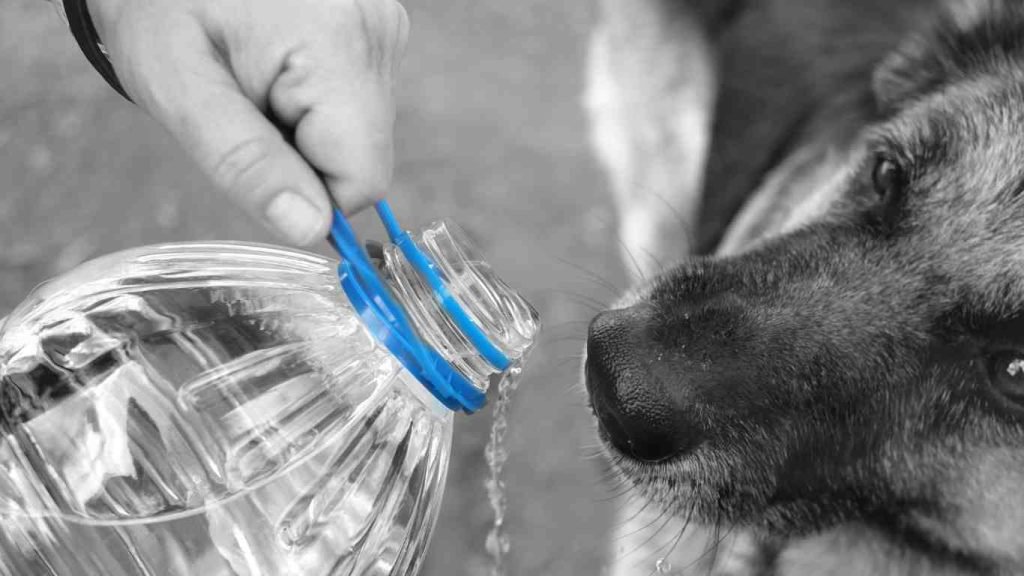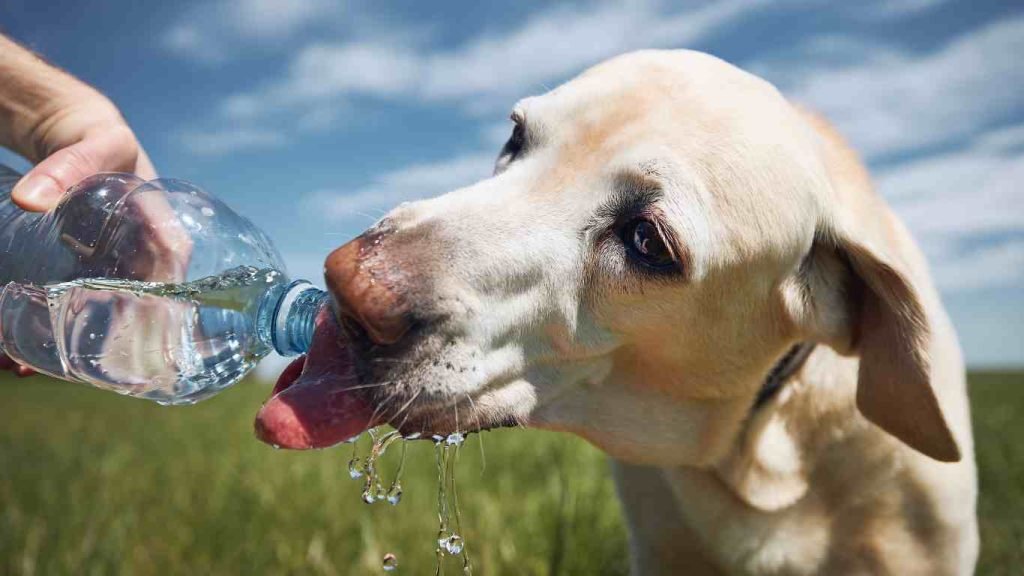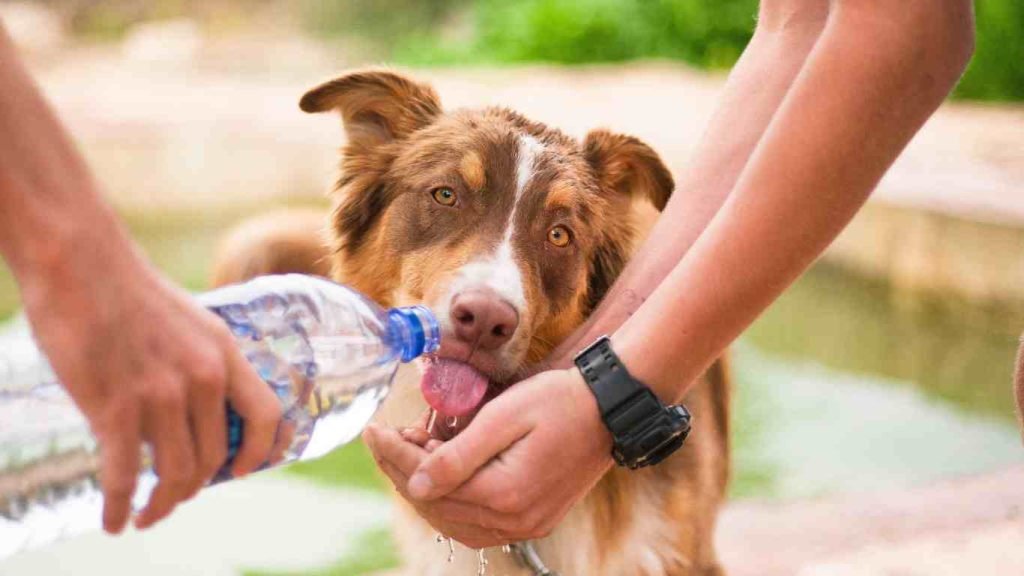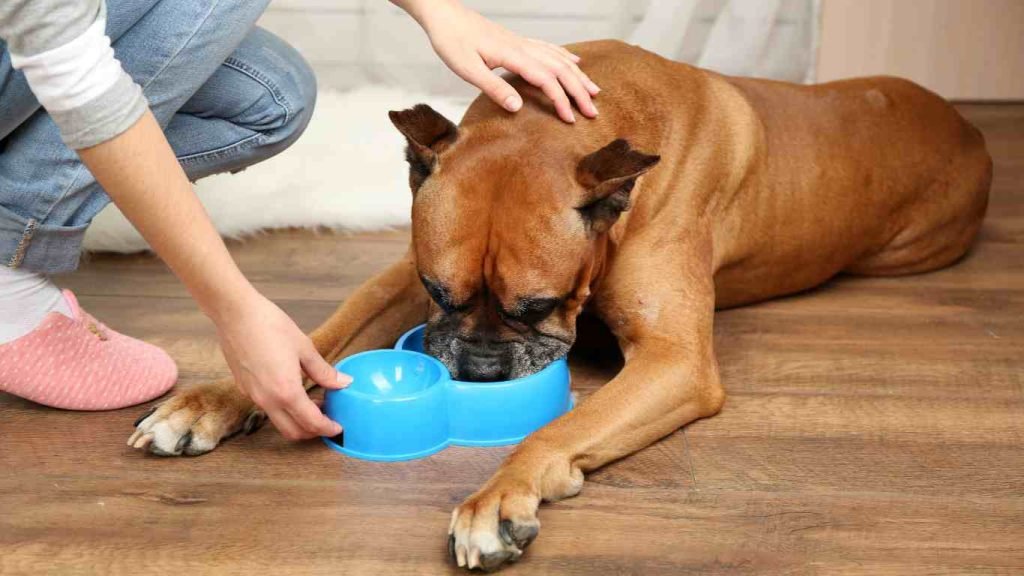Every year, millions of dollars are spent by pet owners in the United States on specialty drinks and diets for their furry companions. With sports beverages like Powerade being a staple in many households, it’s natural to wonder: can dogs drink Powerade? While sharing a meal or drink with your pet might seem like an act of love, it’s critical to understand that dogs and Powerade may not be the perfect match. The ingredients in Powerade, tailored for human athletes, aren’t necessarily suited for pets and could have adverse effects on your dog’s health.
Many pet owners might not realize that the same things that help rehydrate humans after a vigorous workout might not offer the same benefits to their canine friends. In truth, Powerade and other sports drinks can pose serious health risks to dogs, due to ingredients that aren’t ideal, like the high sugar content. It’s always best to err on the side of caution and provide the tried-and-true hydration method for dogs: fresh water. But in the quest to keep your dog healthy and hydrated, are there instances when Powerade for pets is actually safe? We’ll dive into that question, along with outlining some significant safety tips to ensure your pet remains in peak physical condition.
Core Insights to Can Dogs Drink Powerade:
The Sugary Truth: Is Powerade Safe for Dogs?
When it comes to quenching your furry friend’s thirst, you might wonder, is Powerade safe for dogs? The straight answer from veterinarians and animal nutritionists is a resounding no. The high levels of sugar present in sports drinks like Powerade pose a serious risk to your dog’s well-being. Here’s why tapping into these sweetened beverages is a bad idea for your canine companion.
- Sugar in Powerade can lead to weight gain and obesity in dogs.
- Overconsumption of sugary drinks increases the risk of diabetes.
- Dental issues could arise due to the erosive effect of sugar on enamel.
Recognizing the risks associated with dogs and sports drinks, it’s vital to consult with a veterinarian before even considering sharing your Powerade with your pet. The table below contrasts Powerade’s high sugar content with the recommended hydration choices for dogs:
| Beverage | Sugar Content | Suitability for Dogs |
|---|---|---|
| Powerade | High | Not Recommended |
| Fresh Water | None | Highly Recommended |
| Canine Rehydration Solutions | Varies | Consult Veterinarian |
While sharing your post-workout drink with your dog might seem harmless, it can undeniably lead to negative health consequences. Prioritizing your dog’s health means sticking to water or vet-approved hydration solutions. So next time you ponder upon dogs and sports drinks, remember that plain water is the gold standard for keeping your four-legged athlete hydrated and healthy.

Can Dogs Drink Powerade: Understanding the Risks
Diving into the relationship between dogs and Powerade, it becomes clear why sports drinks are not fitting hydration substitutes for our canine companions. While it can be tempting to share your Powerade with your dog during a day at the park or after a game of fetch, understanding the implications of such choices is critical for your dog’s health.
Why High Sugar Content is a Concern for Dogs
The high sugar content in Powerade and other sports drinks is particularly troubling when considering a dog’s health. Unlike humans, dogs do not have the same dietary requirements, especially concerning added sugars and electrolytes. The overconsumption of sugar can lead to weight gain, dental problems, and diabetes in dogs—conditions that any pet owner would want to prevent. This is one of the main reasons why offering sports drinks to your furry friend is discouraged.
Dog Sports Drink (Prebiotic, Isotonic Drink for Dogs) | Electrolytes, Nutrients & Amino Acids
Alternatives to Sports Drinks for Hydrating Your Dog
Rather than turning to sports drinks like Powerade for hydration, there are safer alternatives tailored to the specific needs of dogs. Below is a table comparing common hydration methods for dogs:
| Hydration Method | Benefits | Considerations |
|---|---|---|
| Fresh Water | Readily available, free from additives | Always provide unlimited access |
| Canine Rehydration Solutions | Specifically formulated for dogs, contains appropriate electrolyte balance | Use under vet supervision, ideal during illness or intense activity |
| Wet Dog Food | Provides hydration along with nutrition | Can be used as part of regular diet to increase water intake |
In the event that your dog is in need of rehydration potentially due to illness, it is vital to consult a veterinarian for proper guidance. They may recommend veterinary-formulated hydration solutions that are a far cry from your bottle of Powerade, designed with your dog’s health and physiology in mind. Ultimately, staying informed about the risks of dogs and sports drinks is pivotal in securing your pet’s well-being.

Dehydration in Dogs: What to Give Your Pooch Instead of Powerade
As caring pet owners, it’s natural to wonder, can dogs drink Powerade, especially when your four-legged friend is showing signs of dehydration. While you might think that Powerade can help your dog stay hydrated due to its electrolyte content, it’s crucial to understand that what works for humans may not be suitable for pets. The truth is that dogs and Powerade may not be the best match due to the potential health risks involved.
When dehydration strikes your pooch, fresh, clean water stands out as the paramount choice for restoration. If you believe water alone isn’t doing enough during those rare instances such as illness or after intensive exercise, there are alternatives you can consider. But it’s essential that these measures are taken with guidance from a knowledgeable veterinarian.
- Veterinary-Approved Rehydration Solutions: Specially formulated hydration solutions for dogs are designed to replenish fluids without the high sugar and caffeine content found in Powerade for pets.
- Diluted Pedialyte: Under a vet’s direction, unflavored Pedialyte can be used in moderate amounts to help your dog rehydrate.
- Homemade Hydration Broth: A homemade broth with pet-safe ingredients can be an enticing way for your dog to increase fluid intake safely.
Always bear in mind that introducing anything new to your dog’s diet could lead to unexpected issues if not properly overseen. If you’re presented with choices for treating your dog’s dehydration, it’s crucial to consult your vet for advice that’s tailored to your dog’s specific needs.
In brief, while it may seem like a good idea to offer a bit of Powerade to a dehydrated dog, the safest route is to avoid it altogether. Stick to vet-recommended solutions and keep that bowl of fresh water full and accessible to ensure your pet stays happily hydrated with appropriate options.

Common Household Drinks and Your Dog’s Health
As caring pet parents, you’re always on the lookout for what’s best for your furry companions. While you might enjoy a variety of beverages on a daily basis, it’s important to discern which of these can safely be shared with your pets, and which could pose severe health risks. For instance, dogs and Powerade don’t mix due to its high sugar and artificial ingredient content. But what about other common household drinks?
Why Milk and Other Dairy Products May Not Be Safe
Contrary to popular belief, milk isn’t always a treat for dogs. In fact, many canines are lactose intolerant, meaning their digestive systems cannot properly break down the lactose in milk and other dairy products. This intolerance can lead to uncomfortable symptoms such as stomach pain, diarrhea, and gas. Let’s keep our four-legged friends free from these avoidable discomforts by choosing safer alternatives.
Bactine MAX First Aid Spray - Pain Relief Cleansing Spray with 4% Lidocaine
$5.74 in stock
The Dangers of Caffeine: Coffee, Tea, and Soda
Most of us start our day with a cup of coffee or tea, and may reach for a soda as an afternoon pick-me-up. These drinks, however, can be incredibly dangerous for dogs due to their caffeine content. Even a small amount of caffeine can cause dogs to experience hyperactivity, restlessness, and tremors. In severe cases, they could suffer from seizures or heart arrhythmias, which are potentially life-threatening conditions. It’s imperative to keep these drinks well out of reach from your pets and never consider them as Powerade for pets.
To ensure you’re making the best choices for your dog’s health and hydration, familiarize yourself with the safe and unsafe beverages they can consume:
| Drink Type | Safe for Dogs? | Notes |
|---|---|---|
| Fresh Water | Yes | Always the best choice for hydration. |
| Milk | No | Many dogs are lactose intolerant. May cause digestive upset. |
| Coffee/Tea | No | Contain caffeine which can be toxic to dogs. |
| Soda | No | Contains caffeine and high sugar levels. |
| Canine Rehydration Solutions | Yes – With Vet Approval | Formulated specifically for dogs’ dietary needs. |
Instead of reaching for Powerade or other human beverages to quench your dog’s thirst, always provide them with a fresh bowl of water and talk to your vet about dog-specific rehydration solutions. Your dog’s health and well-being will be better for it.

Understanding the Composition of Sports Drinks Like Powerade
When considering a beverage like Powerade for pets, it’s essential to delve into why these drinks are tailored for humans and not suited for canine companions. Sports drinks are formulated to address specific nutritional needs that arise during intense physical activities, primarily in humans.
Electrolytes, Sugars, and Osmolality Impact on Dogs
The allure of Powerade lies in its concoction of electrolytes and carbohydrates, crafted to replenish what the body loses through sweat. However, the physiological makeup of dogs differs dramatically from that of humans. What serves as a boon for athletes can be detrimental to our furry friends. The osmolality—the concentration of dissolved particles—of these drinks can disrupt a dog’s internal fluid balance, while excessive sugar intake vastly increases the risk of health complications.
Is There a Safe Amount of Powerade for Dogs?
Discussions around ‘is Powerade safe for dogs’ often come down to the ingredients and their quantities. Veterinary professionals agree that no amount of Powerade can be deemed safe for canine hydration. Unlike humans, dogs do not require this kind of supplemental nutrition. When it comes to hydration, nothing beats the purity and simplicity of water for keeping your pet healthy and hydrated.
Regardless of the brand or flavor, the verdict remains consistent: it’s best to stick to water for your pet’s hydration needs.

Evaluating Powerade Alternatives: Safe Hydration Solutions for Dogs
When it comes to quenching your dog’s thirst, nothing beats the classic simplicity of fresh water. It’s a mistake to think that sports drinks designed for humans, such as Powerade, can be a substitute to water for our canine friends. These beverages may offer electrolyte replenishment for people, but they can pose undue risks for pets. So, let’s explore the safest ways to keep your pup hydrated, especially if they can’t drink Powerade or other sports drinks.
Why Fresh Water is the Best Choice for Your Dog
There’s a reason why every veterinarian’s first recommendation is always fresh, clean water: it’s incredibly effective. Not only is water free of calories, but it also lacks the unnecessary additives found in many commercial beverages. For your dog’s bodily functions to run smoothly and to maintain a stable body temperature, especially after vigorous exercise or in hot weather, regular access to water is essential. In short, hydration is key to your dog’s health, and nothing provides that better than water.

Join Our GeoZoo Family
Subscribe to our Newsletter
When and How to Use Canine Rehydration Solutions
While you may question, “Can dogs drink Powerade?” as a concerned pet parent, you should know that their hydration needs can be met with alternatives specifically formulated for dogs. In situations where your dog is dehydrated or has been advised by a vet to increase fluid intake, canine rehydration solutions come to the rescue. These products are made with a dog’s digestion and nutrient requirements in mind. Moreover, they often feature a balance of electrolytes without the excess sugar or artificial ingredients prevalent in human sports drinks.
- **Canine rehydration solutions** – Ideal for recovery from illness or significant dehydration
- **Homemade rehydration solutions** – Can be crafted with vet guidance for mild dehydration
- **Electrolyte supplements** – Additives that can be mixed with water, reserved for specific health scenarios
Remember, when considering rehydration options for your pet, consult your vet to determine the best course specific to your dog’s needs. Their advice will ensure that you’re giving your furry friend the safest, most appropriate hydration support, without compromising their health for the convenience of human sports drinks like Powerade.

How to Recognize and Respond to Dog Dehydration Symptoms
Keeping your pet hydrated is crucial, but sometimes dehydration can sneak up even on the most vigilant pet owner. Knowing the signs that your furry friend needs more fluids can make all the difference. Plus, being aware of suitable hydration methods helps ensure you don’t mistakenly reach for a bottle of Powerade for pets when trying to quench your pup’s thirst.
Signs Your Dog May Be Dehydrated
Your dog won’t tap you on the shoulder to say they’re parched. Instead, look out for symptoms like lethargy, dry gums, and excessive panting. These can be crucial indicators that your dog is in need of water and potentially suffering from dehydration. Taking note of these signs allows you to react appropriately and timely to their needs.
Dog Sports Drink ( Prebiotic, Isotonic Drink for Dogs) | Electrolytes, Nutrients & Amino Acids
Immediate Steps to Take for a Dehydrated Dog
If you think your dog has become dehydrated, the first step is to offer small, frequent amounts of water. This shouldn’t be mistaken with offering dogs and sports drinks, such as Powerade, which can do more harm than good. If you suspect severe dehydration or your dog doesn’t improve quickly, you should contact your veterinarian promptly for further guidance. Follow these steps:
- Provide a quiet, cool place for your dog to rest.
- Give your dog small amounts of water to sip every few minutes.
- Avoid any temptation to offer flavored or sweetened drinks.
- Monitor your dog’s progress closely and note any changes in their condition.
Relying on the expertise of a vet is essential if you’re unsure about the correct steps to take or if the situation seems dire.

Potentially Toxic Ingredients in Drinks: What Every Dog Owner Should Avoid
As a caring pet owner, it’s essential to recognize that what may be a harmless thirst-quencher for you could potentially be harmful to your canine friend. While you might wonder, can dogs drink Powerade, or ponder over whether is Powerade safe for dogs, there are other household liquids that pose even greater risks to your dog’s health. The culprits range from everyday beverages to substances you would never dream of giving to your pet, yet accidents happen, and awareness is your first line of defense.
Household Liquids That Pose a Risk to Dogs
Some household drinks and substances we regularly consume or come across can be severely toxic to dogs. Sugar and caffeine, the less harmful on the spectrum, are just the tip of the iceberg compared to substances like ethylene glycol and isopropyl alcohol. These are found in antifreeze and cleaning products, respectively, and are incredibly poisonous to canines. It is paramount to diligently keep such potentially toxic substances out of your pet’s reach.
Here’s a list of common household liquids you should avoid allowing your dog to ingest:
- Milk and dairy products – Many dogs are lactose intolerant.
- Alcoholic beverages – Alcohol can be toxic to dogs.
- Caffeine-containing drinks – Such as coffee, tea, and some sodas.
- Antifreeze – Even the smallest amount can be lethal due to ethylene glycol.
- Cleaning products – Isopropyl alcohol and other cleaning agents are dangerous if ingested.
ARCA PET Dog First Aid Kit - Pet Emergency Kit Dog Travel kit
What to Do If Your Dog Ingests Something Harmful
Immediate action is crucial when you suspect that your dog has swallowed something toxic. The typical curiosity of dogs makes them susceptible to ingesting dangerous substances accidentally, and knowing how to respond can save your pet’s life. If you find yourself in such a predicament, where you’re questioning is Powerade safe for dogs after accidental ingestion, or are concerned about any other harmful liquid your dog may have consumed, here’s what to do:
- Do not panic. Stay calm to think clearly and act quickly.
- Remove any remaining substance from your dog’s reach.
- Check your dog’s mouth to ensure no residue of the substance is remaining.
- If you know what your dog ingested, save the container or substance for identification.
- Call your veterinarian or local animal poison control center immediately for advice.
- Do not induce vomiting unless specifically instructed to do so by a professional.
- Take your dog to the vet as soon as possible if recommended or if the condition seems serious.
Being informed about the potential dangers of certain household drinks, including the innocently-considered sports drink like Powerade, could make a significant difference in protecting your dog’s health. Always err on the side of caution and seek professional assistance when uncertainty arises. After all, your dog’s safety comes first.

Scientific Perspective: The Effectiveness of Different Hydration Methods
When considering hydration for your furry companion, particularly during exercise, it’s essential to look at the science behind fluid absorption. Recent studies shed light on how different drinks can affect hydration levels in dogs. Let’s dive into the findings and gauge which options are scientifically proven beneficial for dogs and Powerade or similar sports drinks stand in this spectrum.
Research on Hydration and dPV Responses in Dogs
Dehydration affects the plasma volume (dPV) in your pet, which can lead to serious health issues. Research indicates that hypotonic drinks are more effectively absorbed compared to their isotonic or hypertonic counterparts, thereby supporting better dPV responses during periods of activity. This suggests that for dogs, the right balance of electrolytes and carbohydrates is key to optimal hydration and performance.
MLB Dog Water Bottle - New York Yankees Baseball Pet Water Bottle
$12.98 in stock
Assessing the Benefits of Various Drink Types During Exercise
It’s not just about water intake; it’s the type of drink that matters. Unlike Powerade for pets, which is not designed for canine physiology, specific hypotonic solutions help maintain the hydration levels during and after exercise more efficiently than plain water. Below is a table summarizing the effectiveness of various hydration methods based on scientific research.
| Drink Type | Effectiveness for Canine Hydration | Appropriate for Exercise |
|---|---|---|
| Plain Water | Basic hydration | Yes, always safe |
| Isotonic Sports Drinks (e.g., Powerade) | Not suitable for dogs | No, not recommended |
| Hypertonic Solutions | Less effective, may lead to dehydration | No, can worsen dehydration |
| Veterinary-formulated Hypotonic Solutions | Most effective for maintaining hydration | Yes, with vet approval |
As you can see, while Powerade and similar sports drinks might be popular for human athletes, the science says they’re not the best choice for your dog. Instead, always reach for veterinary-approved hypotonic solutions for your pet’s exercise and hydration needs.
Remember, keeping your dog hydrated is crucial, but it’s just as important to ensure you’re providing them with the right kind of fluid. When in doubt, consult your vet for advice on the best hydration methods for your dog, and leave the Powerade for your gym sessions.

Join Our GeoZoo Family
Subscribe to our Newsletter
Final Remarks
As a pet owner, navigating the plethora of information about what’s best for your furry friend’s health can be challenging. The question often arises: can dogs drink Powerade? The answer is straightforward—Powerade and other sports drinks are not formulated for canine consumption and do not meet their hydration requirements. It is crucial to recognize that the dietary needs of your dog vastly differ from those of humans. Sports drinks contain high levels of sugars and other ingredients that could adversely affect your pet’s health.
To ensure the wellbeing of your dog, always provide access to clean, fresh water. If you’re concerned about hydration or rehydration, especially after exercise or illness, consult with your veterinarian for suitable solutions. They can direct you to products specifically designed for dogs that safely address their hydration needs without the negative impacts of excessive sugar and additives found in human-targeted products like sports drinks. Remember, when it comes to dogs and sports drinks, the latter should stay on the sidelines.
Furthermore, it’s your responsibility to safeguard your dog from other common household beverages that could pose a risk. Learn to identify the signs of dehydration in your dog and understand the correct steps to take should they become distressed. Knowledge on how to act swiftly and appropriately is paramount for the health and safety of your beloved pet. Always prioritize the health of your dog by making informed decisions and seeking professional advice when it comes to what they eat and drink.






